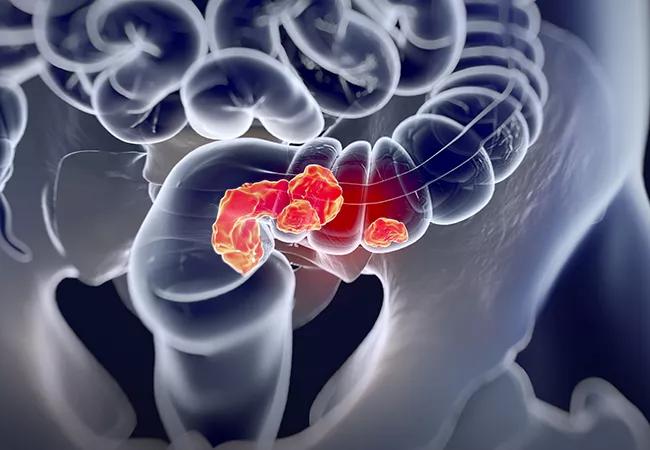The retrospective study also identified predictors for which patients would likely achieve a complete response from TNT

Image content: This image is available to view online.
View image online (https://assets.clevelandclinic.org/transform/ef8ef3b0-d071-4a73-817c-f7afec8afae6/23-DDI-3722060-CQD-650x450-1_jpg)
rectal cancer
Over the past several years, total neoadjuvant therapy (TNT) has become the standard of care for managing rectal cancer. But does it achieve better results than the old approach? A new Cleveland Clinic study says yes.
Advertisement
Cleveland Clinic is a non-profit academic medical center. Advertising on our site helps support our mission. We do not endorse non-Cleveland Clinic products or services. Policy
Just as important, the study also identifies tools clinicians can use to predict which patients will achieve a complete response to treatment, potentially guiding the decision for life-altering surgery.
The study, “What Predicts Complete Response to TNT in Locally Advanced Rectal Cancer?” was presented on May 7 at the 2023 Digestive Disease Week (DDW) conference.
Previously, rectal cancer was typically treated with chemoradiation therapy, followed by surgery, then chemotherapy. Under this regimen, between 20% to 25% of patients were observed to have complete response, explains Emre Gorgun, MD, Vice Chair of Colorectal Surgical Department at the Cleveland Clinic, and principal investigator of the study.
TNT takes a different approach, with the patient completing both chemoradiation and consolidation chemotherapy before undergoing surgery.
“The idea was to increase the complete response rate, and indeed, we found it increased to 37%,” he says. “This is another, serious confirmation that TNT treatment provides a higher complete response rate compared to the previous treatment modality.”
The retrospective study looked at 119 patients with stage 2 to 3 rectal cancer who were treated at the Cleveland Clinic between 2015 and 2021.
Researchers also wanted to know whether there were any characteristics or indicators that could predict which patients would achieve a complete response from TNT alone, potentially avoiding the need for surgery.
They found only one predictor: patients who were found to have extramural vascular invasion (EMVI) in pre-op MRI imaging were less likely to be complete responders.
Advertisement
However, they also found that, when evaluating patients between treatments, a combined imaging and endoscopic evaluation approach produced the best predictive results.
“A very important take-home message was that using flexible endoscopy in combination with MRI imaging is critical for the best prediction of complete response,” Dr. Gorgun says. “If you’re just doing one, endoscopy is more sensitive than MRI. However, the gold standard is using them together in a combined fashion according to the results of our study.”
Next, Dr. Gorgun says researchers will continue to study treatment modalities for rectal cancer and analyze how to predict complete response with the goal of avoiding organ-removing surgery to preserve patients’ quality of life.
“TNT as an organ-preserving approach in the management of rectal cancer is continuing to grow, and we expect surgeons will perform fewer proctectomies in the future,” he said. “We as healthcare providers should continue to look out for better methods to predict and differentiate complete responders from non-complete responders in the treatment of rectal cancer patients.”
Advertisement
Advertisement
First-of-its-kind research investigates the viability of standard screening to reduce the burden of late-stage cancer diagnoses
Global R&D efforts expanding first-line and relapse therapy options for patients
Study demonstrates ability to reduce patients’ reliance on phlebotomies to stabilize hematocrit levels
A case study on the value of access to novel therapies through clinical trials
Findings highlight an association between obesity and an increased incidence of moderate-severe disease
Cleveland Clinic Cancer Institute takes multi-faceted approach to increasing clinical trial access 23456
Key learnings from DESTINY trials
Overall survival in patients treated since 2008 is nearly 20% higher than in earlier patients